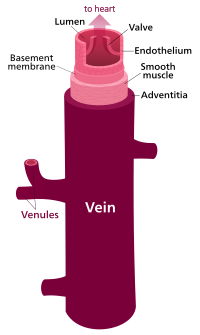
Photo from wikipedia
Purpose: To illustrate diagnostic and interventional imaging for the characterization and treatment of portal vein thrombosis (PVT). Introduction: The broad spectrum of congenital and acquired PVT manifestations is illustrated, with… Click to show full abstract
Purpose: To illustrate diagnostic and interventional imaging for the characterization and treatment of portal vein thrombosis (PVT). Introduction: The broad spectrum of congenital and acquired PVT manifestations is illustrated, with a focus on the pediatric population; diagnostic and interventional imaging techniques are described. Description: PVT frequently presents as an incidental finding at imaging in the screening for liver diseases or for other unrelated reasons. PVT can be classified based on: extension (intrahepatic, extrahepatic, involving the spleno-mesenteric tract, etc.); degree (partial or complete); onset (acute or chronic); and with or without cavernomatous transformation. This comprehensive review relies on the experience gained from a large series of congenital and acquired PVT in a referral center for pediatric and adult liver transplantation. Diagnostic and interventional imaging techniques are described, including: color–Doppler and contrast-enhanced Ultrasound; CT and MR angiography; retrograde portography; percutaneous transhepatic, transplenic, and transmesenteric portography; transjugular intrahepatic portosystemic shunt creation. Pre- and post-operative imaging assessment of the surgical meso-rex bypass is discussed. The description is enriched with an original series of pictorial imaging findings. Conclusion: PVT is a clinical condition associated with significant morbidity and mortality. Diagnostic and interventional imaging plays a crucial role in both conservative and operative management.
Journal Title: Diagnostics
Year Published: 2022
Link to full text (if available)
Share on Social Media: Sign Up to like & get
recommendations!